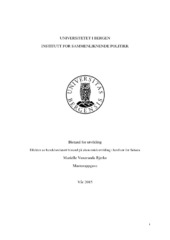| dc.contributor.author | Bjerke, Marielle Veneranda | eng |
| dc.date.accessioned | 2015-08-04T11:51:31Z | |
| dc.date.available | 2015-08-04T11:51:31Z | |
| dc.date.issued | 2015-06-02 | |
| dc.date.submitted | 2015-06-02 | eng |
| dc.identifier.uri | https://hdl.handle.net/1956/10203 | |
| dc.description.abstract | The aim of this thesis is to study the relationship between Aid for Trade, and economic development in sub-Saharan Africa. The research question is: Does trade related aid has a positive direct effect on economic development in sub-Saharan Africa, or is the effect dependent on good institutional quality? Sub-Saharan Africa consists of the least developed states in the world. Theories presented in earlier research find that general aid does not have a significant positive effect on economic development in sub-Saharan Africa. In this research I aim to separate trade related aid from general aid, and see if this particular form of aid can contribute to economic development in sub-Saharan Africa. At present, research on the impact of trade related aid is limited. Some theories on trade related aid presented in earlier research claims that trade related aid does have a positive effect on economic development, while others claim that the effect is conditional of institutional quality. A critique to the last theory is that countries in sub-Saharan Africa consist of poor institutional quality, and this is not something that can be transformed over a short period of time. Therefore, there is a need for other solutions to foster economic development in sub-Saharan Africa that can create economic development, and research needs to step away from the focus of institutional quality and look at other possible factors. This thesis will use a quantitative research design with a panel analysis. The analysis is based on data on Aid for Trade from the OECD databank. The analysis finds significant results from the direct effect on trade related aid on economic development. There are no significant results in the analysis that the effect of trade related aid is determined by institutional quality. The concluding remarks are that Aid for Trade does lead to economic development, and the effect is not determined by institutional quality. | en_US |
| dc.description.abstract | Hensikten med denne oppgaven er å undersøke effekten av handelsrelatert bistand på økonomisk utvikling. Problemstillingen er som følger: Har den direkte effekten av handelsrelatert bistand en positiv effekt på økonomisk utvikling i land sør for Sahara, eller er effekten betinget av institusjonell kvalitet? Resultatene fra analysen ga signifikante resultater på den direkte effekten av handelsrelatert bistand på økonomisk utvikling. Det er ingen signifikante resultater i forholdet mellom de betingede effektene og økonomisk utvikling. Oppgaven konkluderer med at Aid for Trade har en positiv effekt på økonomisk utvikling i land sør for Sahara ubetinget av institusjonell kvalitet. | en_US |
| dc.format.extent | 1347605 bytes | eng |
| dc.format.mimetype | application/pdf | eng |
| dc.language.iso | nob | eng |
| dc.publisher | The University of Bergen | eng |
| dc.rights | Copyright the Author. All rights reserved | eng |
| dc.subject | Aid for Trade | eng |
| dc.subject | sub-Saharan Africa | eng |
| dc.subject | økonomisk utvikling | eng |
| dc.subject | fattigdomsreduksjon | eng |
| dc.subject | økonomisk vekst | eng |
| dc.subject | utviklingsland | eng |
| dc.title | Bistand for utvikling. Effekten av handelsrelatert bistand på økonomisk utvikling i land sør for Sahara | eng |
| dc.type | Master thesis | en_US |
| dc.description.version | publishedVersion | |
| dc.description.degree | Master i Sammenliknende politikk | |
| dc.description.localcode | SAMPOL350 | |
| dc.description.localcode | MASV-SAPO | |
| dc.subject.nus | 731114 | eng |
| fs.subjectcode | SAMPOL350 | |
